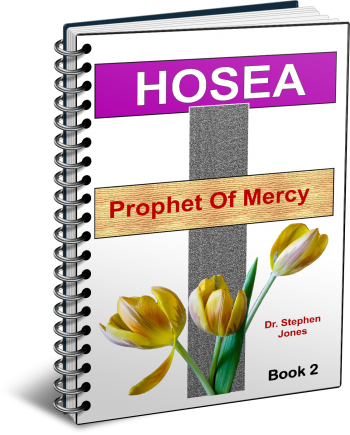Latest Posts
View the latest posts in an easy-to-read list format, with filtering options.

Hosea's failed marriage was a prophetic type of God's failed marriage with Israel. Hosea's harlot wife, Gomer, was named to represent Israel, because Gomer was the official name which the Assyrians called Israel. Her divorce and subsequent redemption shows the mercy of God.
Category - Bible Commentaries

The purpose of divine judgment is to bring about repentance, not destruction. When the people repent, the judgment ceases. Because of this, it appears that repentance never occurs until the end of the judgment. If God decrees a 40-year judgment, it seems that this means the people will not repent until they have been judged 40 years.
Strangely enough, it is not the beating itself that leads us to repentance, but the goodness and kindness of God. Paul tells us in Rom. 2:4, “the kindness of God leads you to repentance.” Under man’s laws (as it is said), beatings continue until morale improves. But God knows that men respond to kindness and love. Hence, divine judgment is not the same as human judgment. Divine judgment is based upon love, which seeks ways to implement mercy. Normally, then, when the sentence of the law nears completion, God begins to intervene with kindness and to draw the people to Himself by the action of the Holy Spirit. Men call these times “revivals.”
The final chapter of Hosea’s prophecy is about “revival,” which is always a call to repentance, based upon the goodness and kindness of God. Hosea 14:1, 2 begins, saying,
1 Return, O Israel, to the Lord your God, for you have stumbled because of your iniquity. 2 Take words with you and return to the Lord. Say to Him, “Take away all iniquity, and receive us graciously, that we may present the fruit of our lips.”
This is not a call to return physically to the old land of Israel. It is a call to return to God from one’s heart. The problem is iniquity, not location. The solution is to “take away all iniquity,” not to relocate to the old land, carrying your iniquity with you.
Long ago, when the Israelites were few, the model was set up in a tiny strip of land, for that was suitable at the time. But today’s model is much greater, for God claims not only the land of Canaan, but also the entire world.
In Lev. 25:23 God says, “the land is mine,” speaking of the land of Canaan. But later God claims all lands and all nations by right of creation, saying in Jer. 27:5, “I have made the earth… by My outstretched arm… and I will give it to the one who is pleasing in My sight.” So also Isaiah 54:5 says that the Holy One of Israel is “the God of all the earth.” He is, in fact, the God of the created universe.
God’s claim is upon all that He created, not just upon a tiny portion of it. Hence, the old model has been replaced by something much greater. In the old model, Israel “stumbled” on account of iniquity, Hosea says. They stumbled over “the rock of offense” (1 Peter 2:8), “because they are disobedient to the word,” Peter says. In other words, if they had been obedient to the word, they would not have stumbled over the stumbling block, which is Jesus Christ, the Rock.
Paul affirms this as well in Rom. 9:31-33,
31 but Israel, pursuing a law of righteousness, did not arrive at that law. 32 Why? Because they did not pursue it by faith, but as though it were by works. They stumbled over the stumbling stone, 33 just as it is written [in Isaiah 28:16], “Behold, I lay in Zion a stone of stumbling and a rock of offense, and he who believes in Him will not be disappointed.”
Both Paul and Isaiah were speaking about Israel, whereas most Christians today think he was speaking to the Jews (i.e., Judah). In fact, they assume that Paul’s entire commentary on Israel in Romans 9-11 was about the people of Judah who had rejected Jesus in the first century. But if we look up the passages that Paul quotes, we find that those passages were directed primarily at the northern house of Israel (or Ephraim). Only secondarily did this apply to Judah—and even then, only because Judah was guilty of the same unbelief.
Isaiah 28:16, quoted by Paul in Rom. 9:33, was specifically addressed to “the drunkards of Ephraim” (Isaiah 28:1). Hence, to interpret Romans 9-11 as a commentary on the Jews in Jerusalem and Judah is to miss most of Paul’s lesson about Israel’s history. Israel had rejected Jesus Christ long before Jesus was born on earth. They rejected Him, Peter says, when “they were disobedient to the word” that came from Yahweh, who was Jesus in His pre-incarnate form.
In the end, however, all men are called to repent. Iniquity is the inner condition of death (mortality), which causes all men to disobey the word and to stumble over the Rock of Offense. Hosea tells Israel to repent, to hear and obey God’s word, so that they may be restored to a relationship with Him. Years later, the significance of this word was revealed when Jesus was born, for then it became plain that the people were to believe in Him and in His word.
In Isaiah 53:5 we read,
5 But He was pierced through for our transgressions, He was crushed [or bruised] for our iniquities…
A transgression is an outward action, whereas iniquity is an inward motive or cause. So when Jesus was pierced outwardly, it was to pay for our transgressions. When Jesus was bruised with internal injuries, it was to pay for our iniquities. He did both, of course, because He paid for the entire sin of the world—even its root causes.
So when Hosea 14:2 tells Israel to say to Him, “take away all iniquity,” he was telling Israel to believe that Jesus Christ paid the penalty for their iniquity by His death on the cross. Further, the prophet says to ask Him to “receive us graciously,” for as Paul says in Eph. 2:8, “by grace you have been saved through faith.” This salvation is “not of yourselves,” Paul says, and in the next verse he adds that it is “not as a result of works.”
In other words, salvation does not come to us through men’s Old Covenant vows, by which they obligate themselves to achieve salvation by obedience—that is, by their own works. Righteousness and salvation could not be gained by the strength of their own will (John 1:13), for no man is capable of fulfilling such vows of perfection. Grace is seen when God vows to make us His people by the power of His own will. We are called to believe in His ability to do as He has vowed, not in our ability to do as we have vowed. These two covenants show us the difference between grace and works.
Removing the iniquity is possible only by removing the death sentence of mortality that was imputed to all men on account of Adam’s sin. When death is removed, iniquity is removed, and then men will cease to transgress the law in their actions. Hence, incorruption and immortality are bound together (1 Cor. 15:54, KJV).
Hosea 14:2 tells us further that the removal of iniquity by His grace is required for us to “present the fruit of our lips.” The Hebrew word translated “fruit” is from par, “a bull, or young bullock.” Hence, this is referring to a sacrifice. But it is no ordinary sacrifice. It was a sacrifice “of our lips.” This is the true sacrifice that God wants—repentant words that come from the altar of one’s heart.
So the sequence is clear. First, iniquity must be removed as an act of New Covenant grace. Then our response is the sacrifice on the altar of our heart, evidenced by words of repentance coming from our lips.
Hosea even puts words into the mouth of such repentant ones, for he continues in Hosea 14:3,
3 “Assyria will not save us. We will not ride on horses; nor will we say again, ‘Our god,’ to the work of our hands; for in Thee the orphan finds mercy.”
Here is the acceptable confession coming from the lips of Israel. It acknowledges that Assyria cannot save us. Only Yahweh-Jesus, the God of Israel and of the whole earth, can save. Such a confession forsakes faith in horses—that is, in fleshly strength, because “their horses are flesh and not spirit” (Isaiah 31:3).
And finally, a true confession of faith never again says that the golden calf is “our god.” True faith is never placed in “the work of our hands,” and if we understand this in the light of the New Covenant, we NEVER again say, “I was saved by my vow (or decision) and by my own will.”
Instead, we recognize that it was God who was gracious enough to intervene and to open our eyes and impart faith in our hearts, so that we would repent and turn to Him. We have only responded to the gracious intervention of God and can take no credit for our decision to follow Him. It is the kindness of God that has led us to repentance.
This is the true bullock that God desires as the fruit of our lips. We must confess Jesus Christ, not a golden calf that is the work of our hands.
Hosea says “in You the orphan finds mercy.” This is a reference to the fact that widows, orphans, aliens, and even the beasts and birds of the field are without coverings. Families in Israel normally found protection under a guardian known as the Kinsman Redeemer. This term is normally mistranslated “avenger of blood” or “revenger of blood,” but it is the Redeemer (ga’al) who is of one’s own bloodline. If a family member became the victim of injustice, the Kinsman Redeemer was responsible to seek justice and satisfaction for his kinsman in order to protect those under his covering.
Widows and orphans often had no covering, so God Himself became their Redeemer, covering them directly. So Exodus 22:21-24 says,
21 And you shall not wrong a stranger or oppress him, for you were strangers in the land of Egypt. 22 You shall not afflict any widow or orphan. 23 If you afflict him at all, and if he does cry out to Me, I will surely hear his cry, 24 and My anger will be kindled, and I will kill you with the sword; and your wives shall become widows and your children fatherless.
All those who are without coverings of men are under God’s direct covering. He will protect all who call upon Him, as the law says. The law specifically mentions “strangers” (that is, foreigners), along with widows and orphans. Hence, if non-Israelites are oppressed by Israelites, the anger of the Lord is kindled against the Israelites who oppress them. But in other places we find that God also protects and provides for the birds and the beasts of the field—all for the same reason. God is their covering.
So Hosea 14:3 says, “in You the orphan finds mercy.”